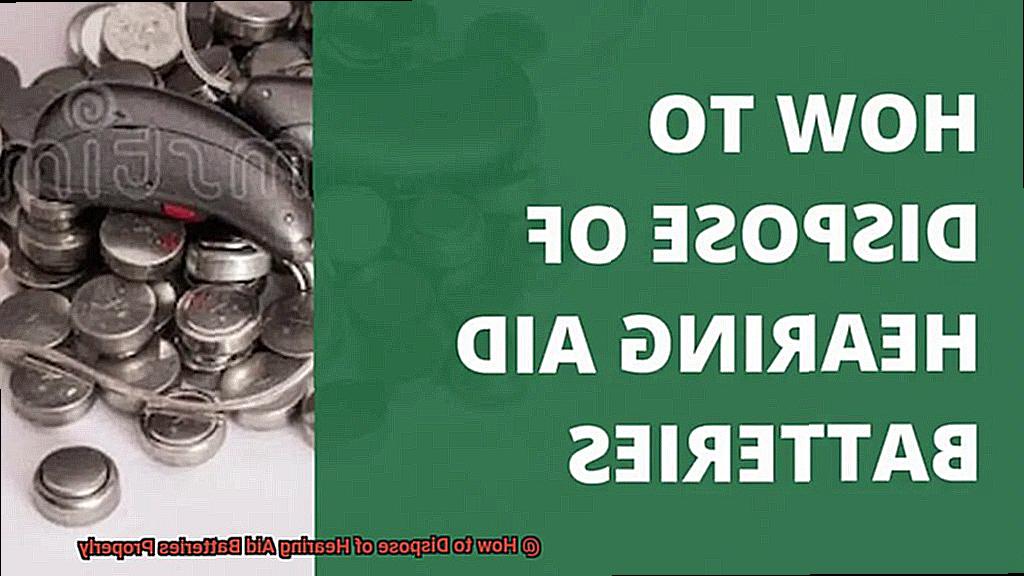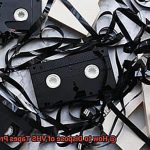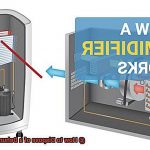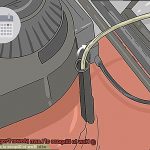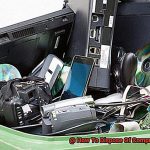Welcome to the wonderful world of hearing aids. These tiny devices are a godsend for those with hearing impairments, allowing them to connect with the world around them. With cutting-edge technology, hearing aids have become more sophisticated and rewarding than ever before. But like all good things, they require proper maintenance, especially when it comes to disposing of their batteries.
Hearing aid batteries contain harmful chemicals that can damage the environment if not disposed of correctly. This is why it’s crucial to know how to dispose of them safely. In this blog post, we’ll guide you through everything you need to know about disposing of hearing aid batteries properly.
We’ll cover various topics such as identifying different types of batteries used in hearing aids, determining their lifespan, and most importantly, how to get rid of old batteries without causing any harm to the environment. Additionally, we’ll provide you with some handy tips on storing new hearing aid batteries effectively.
So whether you’re a seasoned hearing aid user or have a loved one who relies on these devices daily, this blog post is for you. Keep reading to learn how to dispose of your hearing aid batteries properly and help keep our planet safe and healthy.
Recycling Hearing Aid Batteries
Contents
- 1 Recycling Hearing Aid Batteries
- 2 Mail-Back Programs for Disposing of Hearing Aid Batteries
- 3 Never Throw Used Hearing Aid Batteries in the Trash
- 4 Never Burn or Incinerate Used Hearing Aid Batteries
- 5 Laws Governing the Disposal of Hearing Aid Batteries
- 6 The Environmental Impact of Improperly Disposed Hearing Aid Batteries
- 7 The Health Risks Associated with Improperly Disposed Hearing Aid Batteries
- 8 Tips for Storing and Transporting Used Hearing Aid Batteries
- 9 Conclusion
Not only can they harm the environment, but they can also pose a risk to human health if not disposed of correctly. That’s why it’s crucial to understand the process of recycling hearing aid batteries and the benefits it provides for the environment.
It’s important to note that not all hearing aid batteries are recyclable. Unfortunately, the most commonly used zinc-air batteries cannot be recycled. However, silver-zinc and nickel-metal hydride (NiMH) batteries are recyclable. If you have these types of hearing aid batteries and want to recycle them, you need to find a reputable recycling center that accepts them.
Fortunately, many communities have recycling centers that accept small household batteries, including those used in hearing aids. You can check with your local waste management office or search online for recycling centers near you. Once you have found a recycling center, you can drop off your used hearing aid batteries for recycling.
The process of recycling hearing aid batteries involves separating the metals and chemicals in the batteries and reusing them in other products. By doing so, we reduce the need for mining and manufacturing new materials, which can be energy-intensive and polluting. Additionally, properly disposing of hearing aid batteries through recycling or battery mail-back programs helps protect the environment and prevent potential harm to human health.
It’s important to never throw hearing aid batteries in the trash or mix them with other recyclables. This can cause them to rupture and release their hazardous contents into the environment. Remember to never burn or incinerate hearing aid batteries, as this can release toxic fumes into the air.
By recycling your hearing aid batteries, you’re helping conserve natural resources and protect the environment from harmful pollutants. It’s a simple yet effective way to make a positive impact on our planet. So, if you have these types of batteries, make sure to find a reputable recycling center and drop them off properly.
Mail-Back Programs for Disposing of Hearing Aid Batteries
Look no further than mail-back programs. These programs, run by battery manufacturers or recycling companies, provide pre-paid envelopes or boxes for you to easily mail in your used batteries.
The best part of mail-back programs is that they ensure proper disposal of the batteries. The batteries are collected, sorted, and recycled in an environmentally friendly manner. This helps prevent toxic materials from polluting the environment and entering landfills.
Not only are mail-back programs eco-friendly, but they are also incredibly convenient. With everything provided for you, you don’t need to worry about where to dispose of your used batteries or make a special trip to a recycling center. Simply drop them in the mailbox when you receive your pre-paid envelope or box.
While these programs are generally user-friendly, it’s important to note that some programs may have specific requirements for the types of batteries they accept. Make sure to read the instructions carefully before sending your batteries. Additionally, some programs may limit the number of batteries you can send at once.
In conclusion, mail-back programs are a fantastic option for disposing of hearing aid batteries properly. They offer a hassle-free and eco-friendly solution while ensuring proper disposal of the batteries.
Never Throw Used Hearing Aid Batteries in the Trash
These small batteries may seem insignificant, but they contain heavy metals like mercury and lead that can be extremely hazardous to the environment if not disposed of correctly.
When carelessly tossed into the trash, these batteries can leak their toxic contents and contaminate soil and water supplies, putting both humans and wildlife at risk. It’s a serious issue that deserves our attention.
But don’t worry. There are simple and eco-friendly ways to dispose of your used hearing aid batteries. One option is to use a mail-back program that collects and recycles batteries while providing pre-paid envelopes or boxes to send them off without any hassle.
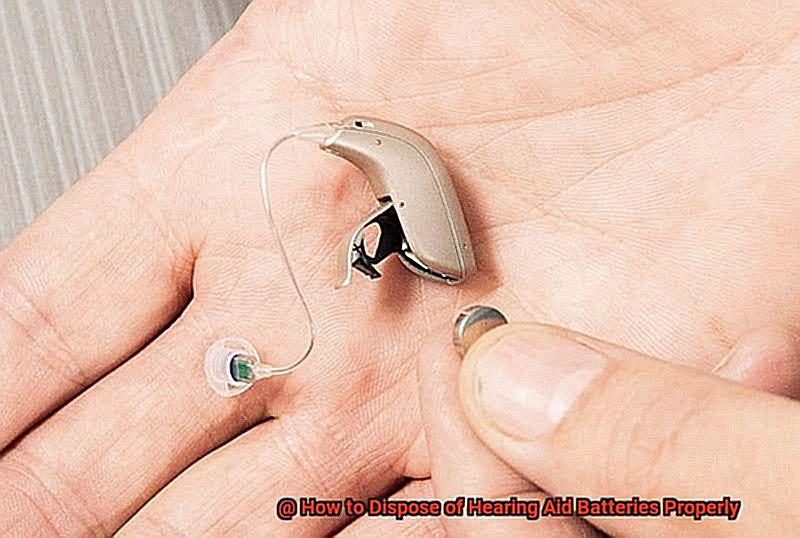
If you prefer the convenience of dropping off your batteries locally, many recycling centers offer programs specifically for hearing aid batteries. Moreover, many manufacturers have take-back programs where they will properly dispose of the batteries for you.
However, if you’re unable to find a recycling or take-back program in your area, don’t panic. You can always contact your local waste management authority for guidance on how to properly dispose of hazardous waste.
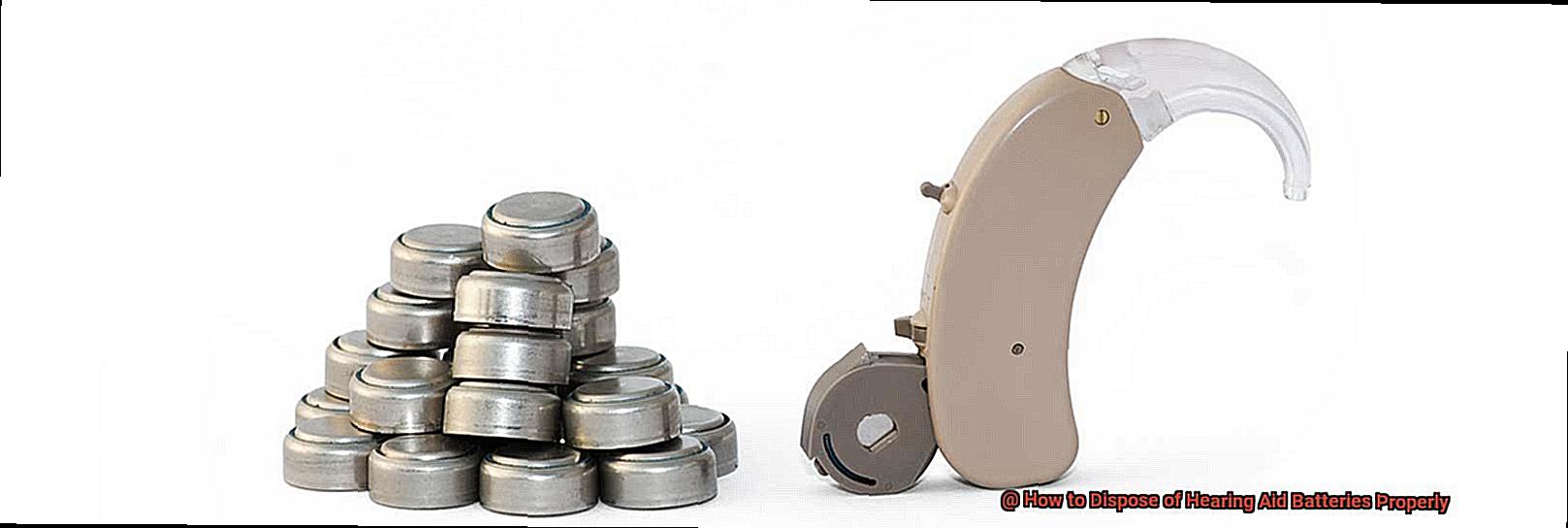
Never Burn or Incinerate Used Hearing Aid Batteries
In our previous section, we talked about the significance of disposing of used hearing aid batteries safely. Today, we’re going to delve into a critical component of this process: why burning or incinerating used hearing aid batteries is a big no-no.
Did you know that hearing aid batteries contain harmful chemicals like mercury, cadmium, and lead? These chemicals can wreak havoc on the environment and human health if released into the air. And that’s precisely what happens when you burn or incinerate them.
Burning used hearing aid batteries releases toxic fumes into the air, which can be incredibly harmful when inhaled. These fumes can cause respiratory problems and other health issues, not to mention long-term environmental damage by contaminating soil and water sources.
So, how do we dispose of used hearing aid batteries safely? The answer is simple: always follow local regulations and guidelines on hazardous waste disposal. Most communities have designated drop-off locations for hazardous waste like used batteries.
By dropping off your used hearing aid batteries at these locations, you can ensure that they are handled and disposed of in a way that’s safe for the environment and human health. Remember, it’s essential to do your part in protecting our planet.
If you’re unsure about how to dispose of used hearing aid batteries in your area, don’t hesitate to get in touch with your local waste management agency or environmental protection agency. They can provide you with information on proper disposal methods while ensuring that you’re following all applicable regulations.
In conclusion, burning or incinerating used hearing aid batteries is never a safe or responsible way to dispose of them. Always keep in mind that proper disposal guidelines and regulations exist for a reason – to safeguard our planet and our health from harmful chemicals.
Laws Governing the Disposal of Hearing Aid Batteries
These tiny batteries may seem insignificant, but improper disposal can have damaging effects on our environment and health. As an expert in this field, I want to inform you about the laws and guidelines put in place to ensure their safe disposal.
The Resource Conservation and Recovery Act (RCRA) is one of the main laws governing the disposal of hearing aid batteries. This law was passed in 1976 to regulate hazardous waste, including batteries. Hearing aid batteries are considered hazardous waste under this law and must be disposed of properly to prevent harm.
The Universal Waste Rule (UWR) is another important law that governs the disposal of hearing aid batteries. Established by the Environmental Protection Agency (EPA) in 1995, it streamlines the management of certain hazardous wastes, including hearing aid batteries which are categorized as universal waste. The UWR allows for a simplified method of managing these batteries compared to other hazardous wastes.
It’s crucial to note that each state may have its own laws regarding the disposal of hearing aid batteries. Some states may have stricter regulations than others, so it’s important to check with your local government to ensure that you are following all applicable laws.
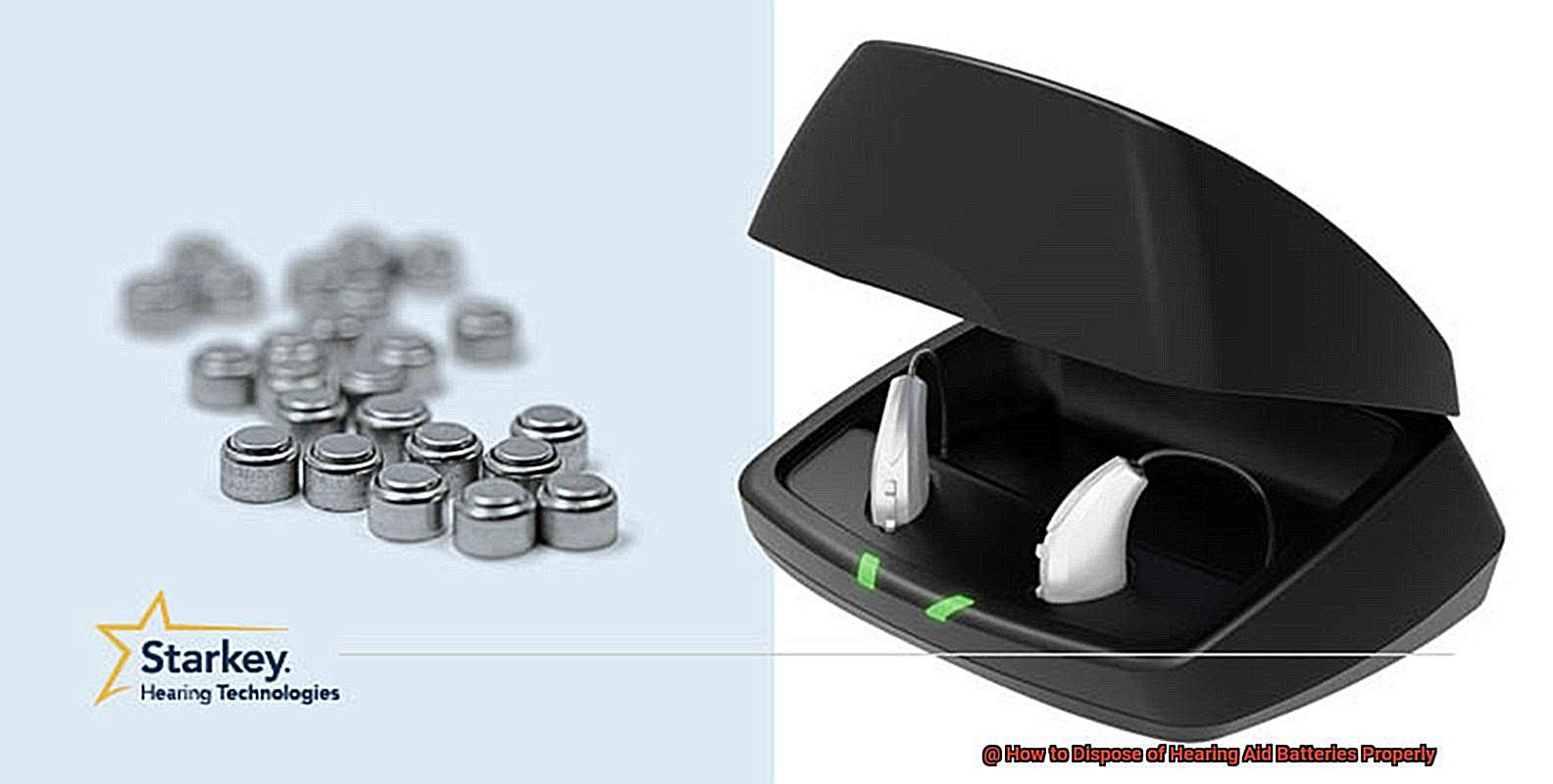
In conclusion, proper disposal of hearing aid batteries is crucial to protect our environment and prevent harm to ourselves and future generations. Following the laws and regulations governing their disposal ensures that they are handled in a safe and responsible manner.
The Environmental Impact of Improperly Disposed Hearing Aid Batteries
Hearing aid batteries contain harmful chemicals like mercury, lead, and cadmium. When not disposed of correctly, these chemicals can seep into the soil and water, polluting our environment. This pollution can harm plants and animals and upset the delicate balance of our ecosystem.
But that’s not all. Improperly disposed hearing aid batteries can contribute to climate change. When these batteries decompose in landfills, they release methane gas, a potent greenhouse gas that harms our atmosphere.
The statistics are alarming: globally, around 1.4 billion hearing aid batteries are used each year, and most of them end up in landfills. This highlights the urgent need for responsible disposal methods for hearing aid batteries.
Fortunately, there are ways to dispose of hearing aid batteries properly. Many hearing aid manufacturers have partnered with recycling companies to provide specialized recycling services for their products. Additionally, household hazardous waste collection centers are equipped to handle hazardous materials like hearing aid batteries and ensure they are disposed of safely.
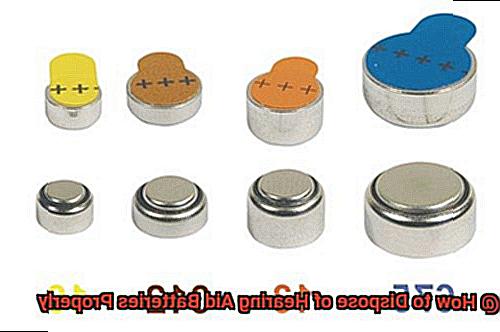
We must all take responsibility for our impact on the environment. By recycling or bringing them to hazardous waste collection centers, we can do our part in preserving the planet for future generations.
The Health Risks Associated with Improperly Disposed Hearing Aid Batteries
These small but mighty devices contain toxic chemicals such as mercury, lead, cadmium, and nickel that can pose a threat to both humans and the environment.
Improper disposal of these batteries can lead to harmful chemicals seeping into the soil and water when they end up in landfills. Even worse, incinerating them with regular household waste can release toxic fumes into the air, causing skin irritation, respiratory problems, and even damage to the central nervous system if exposed for too long.
But it’s not just us humans who are at risk. Wildlife can also suffer from severe health problems or even death if they accidentally ingest or come into contact with these batteries.
Don’t let this happen on your watch. Do your part in protecting our planet and all living beings by recycling or bringing your hearing aid batteries to hazardous waste collection centers.
Tips for Storing and Transporting Used Hearing Aid Batteries
Used hearing aid batteries are essential for individuals who rely on hearing aids to communicate and interact with the world around them. However, it is equally important to ensure that these batteries are disposed of properly to protect both the environment and human health. Proper storage and transportation of used hearing aid batteries play a crucial role in achieving this goal. Here are five tips to help you store and transport your used hearing aid batteries safely.
Keep Them Cool and Dry
The first step in proper storage of used hearing aid batteries is to keep them in a cool, dry place, away from direct sunlight and moisture. High temperatures or humidity can cause the battery to leak or become damaged, making it unsafe for disposal.
Keep Them Separated
Used batteries should be kept separated from other metal objects like keys or coins, as these can cause short-circuiting, leading to potential harm. Additionally, keep them out of reach of children and pets who may accidentally ingest them.
Use a Designated Container
To avoid confusion between new and used batteries, use a designated container or bag that is labeled as “used batteries.” This will prevent accidental ingestion by others who may come across them.
Transport Securely
When moving used batteries, it is important to keep them in a secure container that will prevent them from falling out or spilling. This is especially crucial if you are traveling by plane since specific types of batteries may be restricted from carry-on or checked luggage.
Avoid Extreme Temperatures
Lastly, make sure to keep your used hearing aid batteries at room temperature and avoid exposure to direct sunlight or extreme heat or cold. These conditions may cause damage or leaks, which can be harmful to the environment and human health.
NEljxADzNYo” >
Conclusion
To wrap up, disposing of hearing aid batteries properly is a crucial responsibility that we all share. These tiny powerhouses contain hazardous chemicals that can wreak havoc on the environment and human health if not disposed of correctly. But don’t fret. There are several safe and eco-friendly options available.
Recycling used hearing aid batteries is an excellent way to reduce waste and conserve resources. However, not all batteries are recyclable, so it’s essential to find a reputable recycling center that accepts them. It’s worth noting that some manufacturers offer take-back programs for their products, making it even easier to dispose of them properly.
If you prefer a hassle-free option, mail-back programs are a convenient way to dispose of used batteries safely. They provide pre-paid envelopes or boxes for easy mailing while ensuring proper disposal.
Whatever you do, never toss used hearing aid batteries in the trash or burn them as this can release toxic fumes into the air. Instead, reach out to your local waste management authority or environmental protection agency for guidance on proper disposal methods.
Lastly, proper storage and transportation of used hearing aid batteries are crucial for their safe disposal. Keep them cool, dry, separated from other metal objects, and use a designated container labeled as “used batteries” when transporting them.
By following these simple guidelines and regulations, we can all contribute to protecting our planet and future generations from harm caused by improperly disposed hearing aid batteries.
